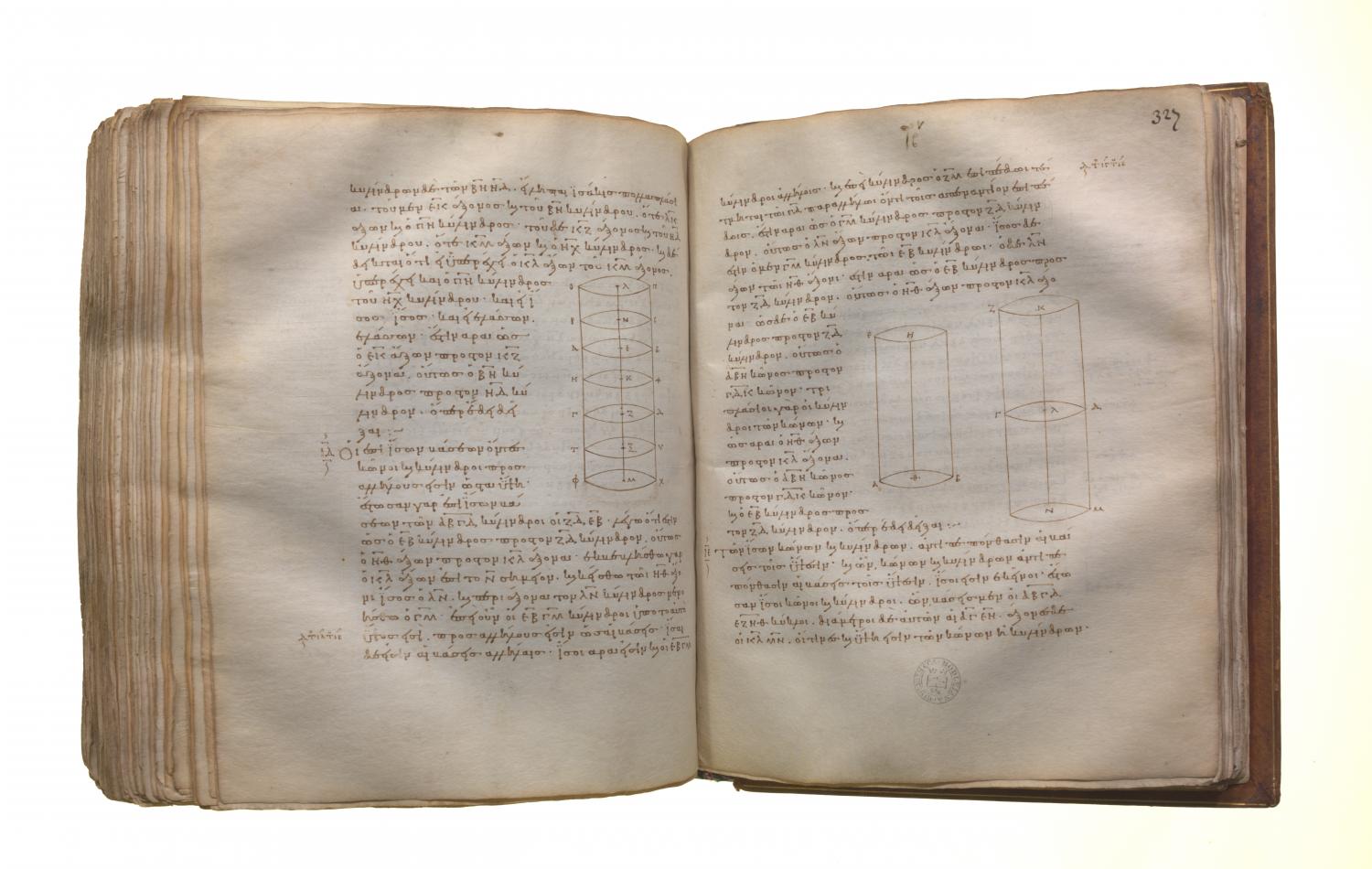Οἱ ἐπὶ ἴσων βάσεων ὄντες κῶνοι καὶ κύλινδροι πρὸς ἀλλήλους εἰσὶν ὡς τὰ ὕψη. Ἔστωσαν γὰρ ἐπὶ ἴσων βάσεων τῶν ΑΒ, ΓΔ κύκλων κύλινδροι οἱ ΕΒ, ΖΔ: λέγω, ὅτι ἐστὶν ὡς ὁ ΕΒ κύλινδρος πρὸς τὸν ΖΔ κύλινδρον, οὕτως ὁ ΗΘ ἄξων πρὸς τὸν ΚΛ ἄξονα. Ἐκβεβλήσθω γὰρ ὁ ΚΛ ἄξων ἐπὶ τὸ Ν σημεῖον, καὶ κείσθω τῷ ΗΘ ἄξονι ἴσος ὁ ΛΝ, καὶ περὶ ἄξονα τὸν ΛΝ κύλινδρος νενοήσθω ὁ ΓΜ. ἐπεὶ οὖν οἱ ΕΒ, ΓΜ κύλινδροι ὑπὸ τὸ αὐτὸ ὕψος εἰσίν, πρὸς ἀλλήλους εἰσὶν ὡς αἱ βάσεις. ἴσαι δέ εἰσιν αἱ βάσεις ἀλλήλαις: ἴσοι ἄρα εἰσὶ καὶ οἱ ΕΒ, ΓΜ κύλινδροι. καὶ ἐπεὶ κύλινδρος ὁ ΖΜ ἐπιπέδῳ τέτμηται τῷ ΓΔ παραλλήλῳ ὄντι τοῖς ἀπεναντίον ἐπιπέδοις, ἔστιν ἄρα ὡς ὁ ΓΜ κύλινδρος πρὸς τὸν ΖΔ κύλινδρον, οὕτως ὁ ΛΝ ἄξων πρὸς τὸν ΚΛ ἄξονα. ἴσος δέ ἐστιν ὁ μὲν ΓΜ κύλινδρος τῷ ΕΒ κυλίνδρῳ, ὁ δὲ ΛΝ ἄξων τῷ ΗΘ ἄξονι: ἔστιν ἄρα ὡς ὁ ΕΒ κύλινδρος πρὸς τὸν ΖΔ κύλινδρον, οὕτως ὁ ΗΘ ἄξων πρὸς τὸν ΚΛ ἄξονα. ὡς δὲ ὁ ΕΒ κύλινδρος πρὸς τὸν ΖΔ κύλινδρον, οὕτως ὁ ΑΒΗ κῶνος πρὸς τὸν ΓΔΚ κῶνον. καὶ ὡς ἄρα ὁ ΗΘ ἄξων πρὸς τὸν ΚΛ ἄξονα, οὕτως ὁ ΑΒΗ κῶνος πρὸς τὸν ΓΔΚ κῶνον καὶ ὁ ΕΒ κύλινδρος πρὸς τὸν ΖΔ κύλινδρον: ὅπερ ἔδει δεῖξαι.
Cones and cylinders which are on equal bases are to one another as their heights. For let EB, FD be cylinders on equal bases, the circles AB, CD; I say that, as the cylinder EB is to the cylinder FD, so is the axis GH to the axis KL. For let the axis KL be produced to the point N, let LN be made equal to the axis GH, and let the cylinder CM be conceived about LN as axis. Since then the cylinders EB, CM are of the same height, they are to one another as their bases. [XII. 11] But the bases are equal to one another; therefore the cylinders EB, CM are also equal. And, since the cylinder FM has been cut by the plane CD which is parallel to its opposite planes, therefore, as the cylinder CM is to the cylinder FD, so is the axis LN to the axis KL. [XII. 13] But the cylinder CM is equal to the cylinder EB, and the axis LN to the axis GH; therefore, as the cylinder EB is to the cylinder FD, so is the axis GH to the axis KL. But, as the cylinder EB is to the cylinder FD, so is the cone ABG to the cone CDK. [XII. 10]
